 |
THE SEQUEL TO THE HOUSE OF GOD: MAN’S 4TH BEST HOSPITAL (2019)
“Any doctor I know read House of God and was transformed by it. It was an honest, raw and unapologetic journey into the world of a hospital internship. It was like being let in on the secret handshake and all the rituals that accompany it. Best of all, the narrator and author deftly pulled on all our emotions, including humor and anxiety, to spin out a universal human drama that has stuck with me decades later. With Man’s 4th Best hospital, Dr Sam Shem has done it again. This time all of us–doctors and patients alike–are along for the ride into the entire universe of medicine, which is at once both wonderful and ludicrous. The story of doctors, overwhelmed by long noxious hours in front of billing computers called Electronic Health Records, trying to treat patients humanely even as the hospital is more interested in treating the bottom line, feels so timely and relevant. You will get a little pissed off, double over in laughter and even cry a little. If you read one medical drama, make it this one.” |
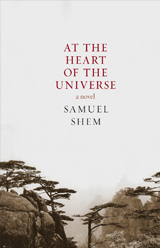 |
At the Heart of the Universe (2016)
The story of two mothers and a father in love with the same daughter, Samuel Shem’s At the Heart of the Universe is an epic novel set deep in rural China against the backdrop of an ancient mountain monastery during the time of the one-child-per-family policy. Inspired by the author’s experiences as parent of an adopted child, it describes the drama of adoption and the journey of loss and rebirth that can happen when a daughter brings together her adopted mother and father with her birth mother high on a mountaintop. Set in 1991 in Changsha, capital of Hunan province, as a Chinese woman abandons her one-month-old daughter in a pile of celery in a busy market, and then shifting to Changsha ten years later as the daughter returns with her adopted American parents, the story moves across southern China until, high atop Emei San, one of China’s “sacred mountains” with a Buddhist temple, the four are brought together in the wilderness—a perilous and explosive time that unleashes their heartbreak and suffering and, remarkably, transcends it to shared compassion, and new beginnings. |
 |
THE BUDDHA’S WIFE (2015)
It is said that The Buddha, on the morning of his only child’s birth, left his wife and son to “go forth” to seek enlightenment, without saying goodbye. What do we know of his wife Yasodhara and his son Rahula? The Buddha’s Wife brings this rarely told story of Yasodhara—”She who stays”—and her community, to the forefront, offering a spiritual parable and portrait of these compelling and compassionate characters. The Readers Companion offers practical applications of their discoveries and teachings for our modern lives. Princess Yasodhara’s journey is one of loss, grief, suffering. and the growth of wisdom and compassion. Through it, she experiencees her own awakening within the deep bonds of community and “ordinary” relationships. While traditional Buddhism emphasizes solitary, silent meditation, even in the presence of others, Yasodhara’s experiences point to the Path of Right Relation, of opening and cultivating insight and compassion in community. Awakening not alone, but together with others. |
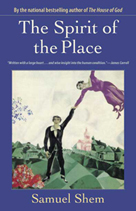 |
THE SPIRIT OF THE PLACE (2008) From the first line–“Even a shy American can be happy in Italy, and Orville Rose was about as happy as a childless man can be”–this is a novel of love and death, of mothers and sons, of doctors and patients, and, above all, of “The Spirit of the Place”, a quirky small Hudson River town “plagued by breakage”–a novel filled with the ineffable “Shem-humor” and pointed insight and drama. Dr. Orville Rose returns to visit his hometown of “Columbia” upon the death of his mother. Despite being in love with a Buddhist yoga teacher in Italy, he is forced by the bizarre terms of his mother’s will to stay for a year and 13 days, and, seeing the declining health of his mentor, the old doctor, winds up working as the doctor to the town he had fled, facing his past friends and demons, challenged to find understanding, love, and a home. Read More > |
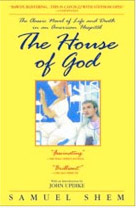 |
THE HOUSE OF GOD (1978)
“Bawdy, blistering… This is Catch 22 with stethescopes.” -Cosmopolitan The outrageously funny, bitingly brilliant novel of Dr. Read the new introduction by John Updike!
|
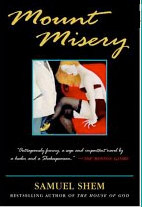 |
MOUNT MISERY (1996) “Outrageously funny, a sage and important novel by a healer and a Shakespearean”-Boston Globe The sequel to THE HOUSE OF GOD, Dr. Basch entering his training to be a psychiatrist at a large mental hospital called “Mount Misery.” The same outrageous humor, gut-wrenching drama, love and death, as Roy seaches to become not just a doctor but a healer-a novel called “another medical classic,” “outrageously funny, a sage and important novel by a healer and a Shakespearean,” “supberbly incisive and witty, a carnival of fascinating secrets and terrible abuses.” |
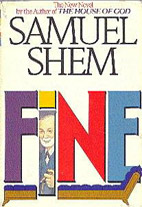 |
FINE (1985)
“Funny…Full of dazzling, zany intelligence…energetic and exuberant.” – New York Times The story of Dr. Fine, a young man learning to be the complete psychiatrist: doing scientific research on memory (teaching grasshoppers to lift their legs and eat calcium pills), becoming a psychoanalyst, caught up in a mystery involving a killer patient, and, above all, trying to find the answer to two questions: “What is love?” and “How do people change?”–“Exhilarating, a glittering gemstone, dazzling,” “full of dazzling, zany intelligence,” “a story filled with metaphysical overtones,” “a rolicking journey of self-discovery and love.” |